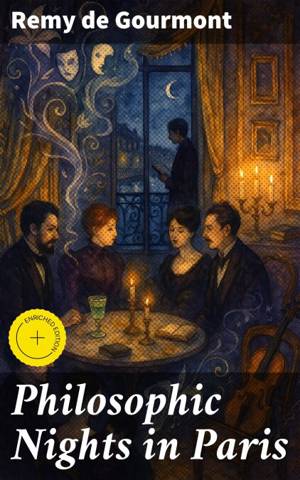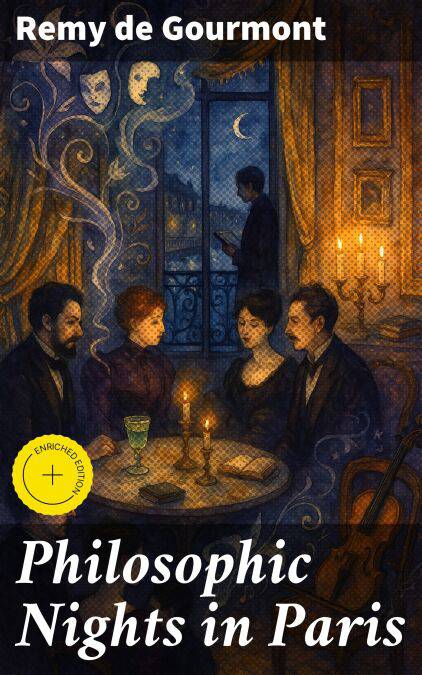
- Afhalen na 1 uur in een winkel met voorraad
- Gratis thuislevering in België vanaf € 30
- Ruim aanbod met 7 miljoen producten
- Afhalen na 1 uur in een winkel met voorraad
- Gratis thuislevering in België vanaf € 30
- Ruim aanbod met 7 miljoen producten
Zoeken
Philosophic Nights in Paris E-BOOK
Enriched edition. Exploring Parisian Literary Salons and the Symbolist Movement in 19th Century Cultural Philosophy
Remy de Gourmont
E-book | Engels
€ 1,99
+ 1 punten
Omschrijving
In "Philosophic Nights in Paris," Remy de Gourmont offers a compelling exploration of the interplay between philosophy and sensory experience, particularly within the vibrant context of Parisian life. The text is characterized by its lyrical prose and an impressionistic style that captures the essence of early 20th-century thought. De Gourmont deftly navigates topics such as aesthetics, existential musings, and the nature of love, presenting them through a series of contemplative vignettes that immerse readers in the atmospheric richness of Paris. This work stands as both a homage to and a critique of the intellectual currents of his time, notably influenced by symbolist and realist movements in literature. Remy de Gourmont, a prominent figure in the Symbolist movement, was well-versed in various philosophies and art forms, which significantly shaped his worldview. His experiences as a writer and critic in the bohemian circles of Paris exposed him to diverse ideas and artistic expressions, fueling his desire to explore deeper philosophical inquiries through literature. De Gourmont's profound appreciation for the complexities of life and the human experience is deftly articulated in this work, revealing his unique stance as an intellectual. "Philosophic Nights in Paris" invites readers to engage with the poetic intricacies of thought and emotion, making it an essential read for those interested in philosophy, literary aesthetics, and the socio-cultural dynamics of early modernity. Gourmont's reflections resonate with anyone seeking a deeper understanding of the existential questions that haunt contemporary existence.
In this enriched edition, we have carefully created added value for your reading experience:
- A succinct Introduction situates the work's timeless appeal and themes.
- The Synopsis outlines the central plot, highlighting key developments without spoiling critical twists.
- A detailed Historical Context immerses you in the era's events and influences that shaped the writing.
- A thorough Analysis dissects symbols, motifs, and character arcs to unearth underlying meanings.
- Reflection questions prompt you to engage personally with the work's messages, connecting them to modern life.
- Hand‐picked Memorable Quotes shine a spotlight on moments of literary brilliance.
- Interactive footnotes clarify unusual references, historical allusions, and archaic phrases for an effortless, more informed read.
In this enriched edition, we have carefully created added value for your reading experience:
- A succinct Introduction situates the work's timeless appeal and themes.
- The Synopsis outlines the central plot, highlighting key developments without spoiling critical twists.
- A detailed Historical Context immerses you in the era's events and influences that shaped the writing.
- A thorough Analysis dissects symbols, motifs, and character arcs to unearth underlying meanings.
- Reflection questions prompt you to engage personally with the work's messages, connecting them to modern life.
- Hand‐picked Memorable Quotes shine a spotlight on moments of literary brilliance.
- Interactive footnotes clarify unusual references, historical allusions, and archaic phrases for an effortless, more informed read.
Specificaties
Betrokkenen
- Auteur(s):
- Vertaler(s):
- Uitgeverij:
Inhoud
- Aantal bladzijden:
- 199
- Taal:
- Engels
Eigenschappen
- Productcode (EAN):
- 4064066249274
- Verschijningsdatum:
- 4/12/2019
- Uitvoering:
- E-book
- Beveiligd met:
- Digital watermarking
- Formaat:
- ePub

Alleen bij Standaard Boekhandel
+ 1 punten op je klantenkaart van Standaard Boekhandel
Beoordelingen
We publiceren alleen reviews die voldoen aan de voorwaarden voor reviews. Bekijk onze voorwaarden voor reviews.







